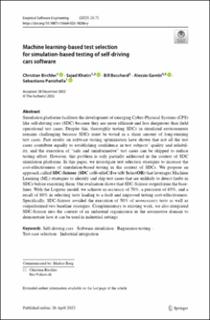Please use this identifier to cite or link to this item:
https://doi.org/10.21256/zhaw-27773Full metadata record
| DC Field | Value | Language |
|---|---|---|
| dc.contributor.author | Birchler, Christian | - |
| dc.contributor.author | Khatiri, Sajad | - |
| dc.contributor.author | Bosshard, Bill | - |
| dc.contributor.author | Gambi, Alessio | - |
| dc.contributor.author | Panichella, Sebastiano | - |
| dc.date.accessioned | 2023-04-28T13:32:24Z | - |
| dc.date.available | 2023-04-28T13:32:24Z | - |
| dc.date.issued | 2023-04-26 | - |
| dc.identifier.issn | 1382-3256 | de_CH |
| dc.identifier.issn | 1573-7616 | de_CH |
| dc.identifier.uri | https://digitalcollection.zhaw.ch/handle/11475/27773 | - |
| dc.description | Erworben im Rahmen der Schweizer Nationallizenzen (http://www.nationallizenzen.ch) | de_CH |
| dc.description.abstract | Simulation platforms facilitate the development of emerging Cyber-Physical Systems (CPS) like self-driving cars (SDC) because they are more efficient and less dangerous than field operational test cases. Despite this, thoroughly testing SDCs in simulated environments remains challenging because SDCs must be tested in a sheer amount of long-running test cases. Past results on software testing optimization have shown that not all the test cases contribute equally to establishing confidence in test subjects’ quality and reliability, and the execution of “safe and uninformative” test cases can be skipped to reduce testing effort. However, this problem is only partially addressed in the context of SDC simulation platforms. In this paper, we investigate test selection strategies to increase the cost-effectiveness of simulation-based testing in the context of SDCs. We propose an approach called SDC-Scissor (SDC coS t-effeC tI ve teS t S electOR) that leverages Machine Learning (ML) strategies to identify and skip test cases that are unlikely to detect faults in SDCs before executing them. Our evaluation shows that SDC-Scissor outperforms the baselines. With the Logistic model, we achieve an accuracy of 70%, a precision of 65%, and a recall of 80% in selecting tests leading to a fault and improved testing cost-effectiveness. Specifically, SDC-Scissor avoided the execution of 50% of unnecessary tests as well as outperformed two baseline strategies. Complementary to existing work, we also integrated SDC-Scissor into the context of an industrial organization in the automotive domain to demonstrate how it can be used in industrial settings. | de_CH |
| dc.language.iso | en | de_CH |
| dc.publisher | Springer | de_CH |
| dc.relation.ispartof | Empirical Software Engineering | de_CH |
| dc.rights | http://creativecommons.org/licenses/by/4.0/ | de_CH |
| dc.subject | Self-driving car | de_CH |
| dc.subject | Software simulation | de_CH |
| dc.subject | Regression testing | de_CH |
| dc.subject | Test case selection | de_CH |
| dc.subject | Industrial integration | de_CH |
| dc.subject.ddc | 005: Computerprogrammierung, Programme und Daten | de_CH |
| dc.subject.ddc | 006: Spezielle Computerverfahren | de_CH |
| dc.title | Machine learning-based test selection for simulation-based testing of self-driving cars software | de_CH |
| dc.type | Beitrag in wissenschaftlicher Zeitschrift | de_CH |
| dcterms.type | Text | de_CH |
| zhaw.departement | School of Engineering | de_CH |
| zhaw.organisationalunit | Institut für Informatik (InIT) | de_CH |
| dc.identifier.doi | 10.1007/s10664-023-10286-y | de_CH |
| dc.identifier.doi | 10.21256/zhaw-27773 | - |
| zhaw.funding.eu | info:eu-repo/grantAgreement/EC/H2020/957254//DevOps for Complex Cyber-physical Systems/COSMOS | de_CH |
| zhaw.issue | 71 | de_CH |
| zhaw.originated.zhaw | Yes | de_CH |
| zhaw.publication.status | publishedVersion | de_CH |
| zhaw.volume | 28 | de_CH |
| zhaw.publication.review | Peer review (Publikation) | de_CH |
| zhaw.webfeed | Service Engineering | de_CH |
| zhaw.funding.zhaw | COSMOS – DevOps for Complex Cyber-physical Systems of Systems | de_CH |
| zhaw.author.additional | No | de_CH |
| zhaw.display.portrait | Yes | de_CH |
| zhaw.relation.references | https://doi.org/10.5281/zenodo.7011983 | de_CH |
| Appears in collections: | Publikationen School of Engineering | |
Files in This Item:
| File | Description | Size | Format | |
|---|---|---|---|---|
| 2023_Birchler-etal_Machine-learning-based-test-selection-self-driving-car-software.pdf | 5.06 MB | Adobe PDF |  View/Open |
Show simple item record
Birchler, C., Khatiri, S., Bosshard, B., Gambi, A., & Panichella, S. (2023). Machine learning-based test selection for simulation-based testing of self-driving cars software. Empirical Software Engineering, 28(71). https://doi.org/10.1007/s10664-023-10286-y
Birchler, C. et al. (2023) ‘Machine learning-based test selection for simulation-based testing of self-driving cars software’, Empirical Software Engineering, 28(71). Available at: https://doi.org/10.1007/s10664-023-10286-y.
C. Birchler, S. Khatiri, B. Bosshard, A. Gambi, and S. Panichella, “Machine learning-based test selection for simulation-based testing of self-driving cars software,” Empirical Software Engineering, vol. 28, no. 71, Apr. 2023, doi: 10.1007/s10664-023-10286-y.
BIRCHLER, Christian, Sajad KHATIRI, Bill BOSSHARD, Alessio GAMBI und Sebastiano PANICHELLA, 2023. Machine learning-based test selection for simulation-based testing of self-driving cars software. Empirical Software Engineering. 26 April 2023. Bd. 28, Nr. 71. DOI 10.1007/s10664-023-10286-y
Birchler, Christian, Sajad Khatiri, Bill Bosshard, Alessio Gambi, and Sebastiano Panichella. 2023. “Machine Learning-Based Test Selection for Simulation-Based Testing of Self-Driving Cars Software.” Empirical Software Engineering 28 (71). https://doi.org/10.1007/s10664-023-10286-y.
Birchler, Christian, et al. “Machine Learning-Based Test Selection for Simulation-Based Testing of Self-Driving Cars Software.” Empirical Software Engineering, vol. 28, no. 71, Apr. 2023, https://doi.org/10.1007/s10664-023-10286-y.
Items in DSpace are protected by copyright, with all rights reserved, unless otherwise indicated.